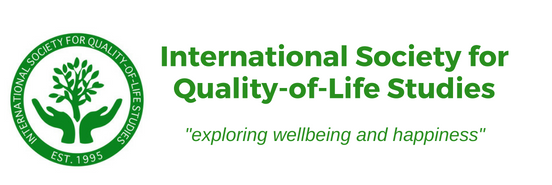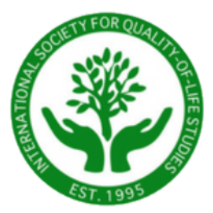Psychology of Wellbeing CertificationDevelop an understanding of psychology of wellbeing and receive a certification from the International Society of Quality-of-Life Studies (ISQOLS), a globally-recognized academic and professional association, with its own publications, journals, conferences, and identity. ISQOLS is collaborating with the Management Institute for Quality-of-Life Studies (MIQOLS) in the administration of this certification program. Download Brochure Sign Up Now.png)
Learn about the Proliferating Research Related to the Psychology of WellbeingThe research involving the psychology of wellbeing is immensely vast and growing exponentially. Learn about the basic concepts and models of the psychology of wellbeing to help you with own scholarly research. Download Brochure Sign Up NowThe certification course includes:
To learn more about the certification program, watch this video overview presented by the course instructor, Prof. Dr. M. Joseph (Joe) Sirgy. Course ModulesIntroductory ModuleThe introductory module lays the philosophical and academic foundation of much of the research on wellbeing and positive mental health, showing the beneficial effects of happy people at work, in terms of health, and to society at large. Topics in this module include:
This certification program is aimed at:
The Instructor’s BiographyM. Joseph Sirgy is a management psychologist (Ph.D., U/Massachusetts, 1979) and the Virginia Tech Real Estate Professor Emeritus of Marketing at Virginia Polytechnic Institute and State University (USA) and Extraordinary Professor at the WorkWell Research Unit at North West University – Potchefstroom Campus (South Africa). He has published extensively in the area of business ethics and quality of life (QOL). His awards include: International Society for Quality-of-Life Studies’ (ISQOLS’) Distinguished Fellow Award, ISQOLS’ Distinguished QOL Researcher, Academy of Marketing Science’s (AMS) Distinguished Fellow Award, AMS’ Harold Berkman Service Award, Virginia Tech’s Pamplin Teaching Excellence Award/Holtzman Outstanding Educator Award and University Certificate of Teaching Excellence, the EuroMed Management Research Award, and the Macromarketing Society’s Robert W. Nason Award. Best paper awards include articles published in the Journal of Happiness Studies, the Journal of Travel Research, and Applied Research in Quality of Life. His editorial responsibilities include co-founding editor of Applied Research in Quality of Life, editor of the QOL section in the Journal of Macromarketing, editor-in-chief of the Journal of Macromarketing, editor of ISQOLS’/Springer’s book series on International Handbooks in QOL, Community QOL Indicators--Best Cases, Applied Research in QOL--Best Practices, and co-editor of the Springer book series on Human Well-Being and Policy Making. 
What our former students say: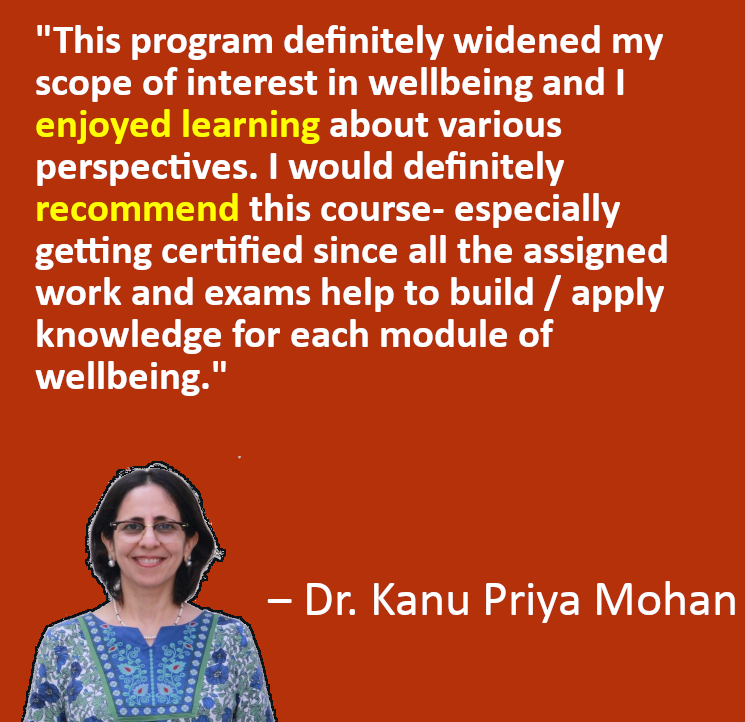
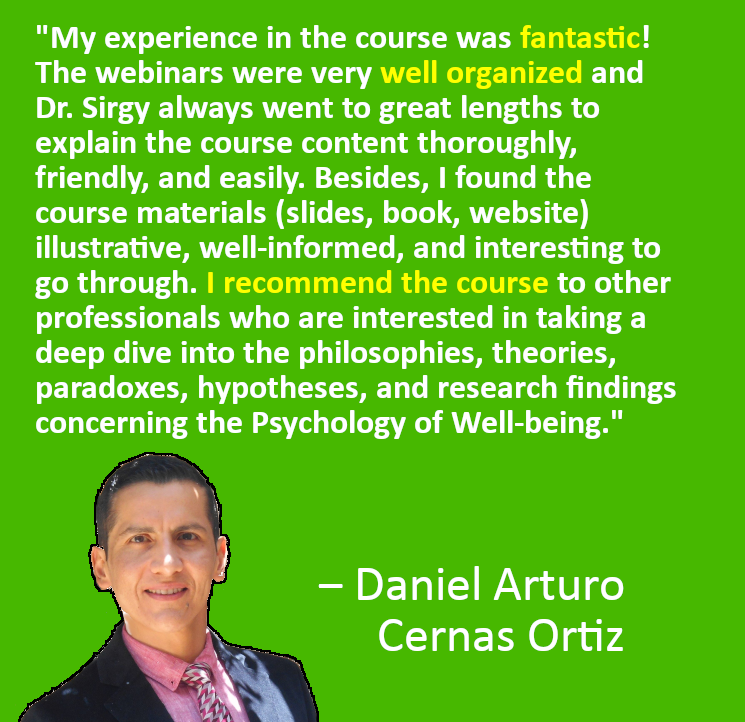
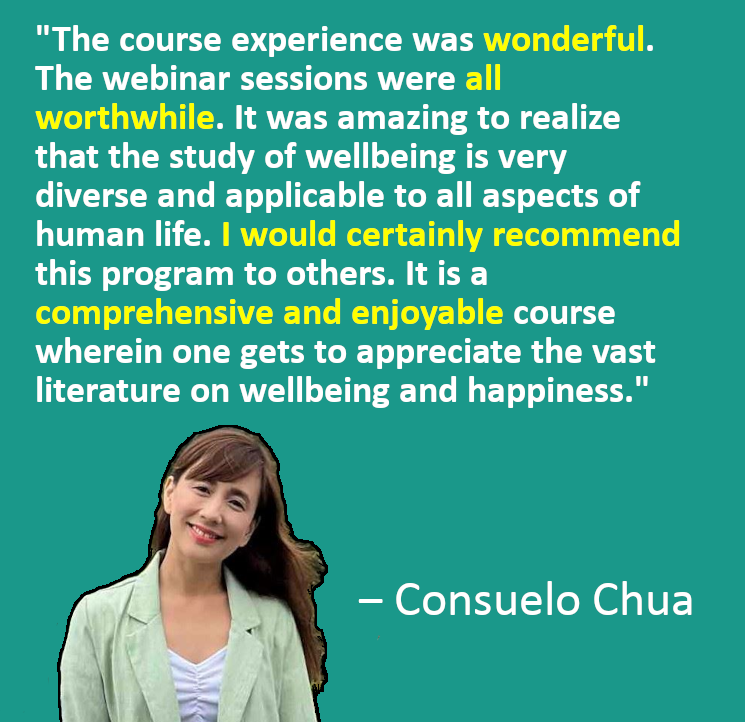
Frequently Asked QuestionsThe course is administered through a self-paced program of instruction. The program includes:
Certification
Audit
No. However, to make the most out of the material provided in this course, it is recommended that the applicants have at least some background in social sciences and rudimentary knowledge of population statistics. The course is asynchronous (i.e., self-paced). The course has six learning modules. After watching the webinar videos pertaining to each module (and reading the assigned chapters with supporting lecture slides and communicating privately with the instructor about issues arising from the assigned module), the course participant alerts the course instructor about their readiness to take an exam covering the assigned module (one of six total modules). The instructor then administers the exam covering the assigned module and provides the course participant with a grade and feedback after which the participant continues to watch the next module (watch the assigned video webinars with readings from supporting material). That is, the process is repeated until the course participant completes the six modules. To pass the course and receive an official certification, registered participants must pass a series of exams. Each exam will involve a set of take-home essay questions provided after completing each learning module (six modules = six exams). Participants will be required to provide answers to the essay questions and submit their answers before completing the next module. Each exam will be graded on the traditional A-F academic scale. A minimum of a total grade of C- is required to pass the course. Participants who do not receive a passing grade can repeat the course. ISQOLS can provide educational credit in terms of Continuing Education Units (CEUs) for the Psychology of Well-Being Certification Program. 1 CEU is equivalent to 10 contact hours. The Psychology of Wellbeing Certification Program involves and estimated 20 contact hours total. This translates into 2 CEUs. Those interested in receiving the CEUs should provide enough information to their own educational institution about the ISQOLS certification program and their own institution would determine if they would accept these CEUs. Many occupations require CEUs to stay licensed in their profession (counselors, life coaches, teachers, etc.). Those who wish to use the certification program for CEUs in meet continuing education requirements of their profession should contact their state/country licensing board and submit information about the course. This certification is provided by the International Society for Quality-of-Life Studies (ISQOLS), a global organization with a mission to promote and encourage research in the field of quality-of-life (QOL), happiness, and wellbeing studies. ISQOLS has members all throughout positioned in academic institutions as well as stakeholder groups, and are well-respected for their contributions to QoL. As such, an official certification would be beneficial to anyone who wants to apply psychological science of wellbeing to guide academic research projects, policy making, managerial decision-making, population statistics, and/or coaching and counseling. The principal benefits you will obtain from the certification course are:
This course is administered by a seasoned QoL researcher, Prof. Dr. M. Joseph (Joe) Sirgy. Course instruction is supported by access to video webinars, lecture slides, readings from the assigned book (The Psychology of Quality of Life: Wellbeing and Positive Mental Health; published by Springer, 2021), exams, feedback on the exam questions, and private communication with the course instructor through e-mail and video conferencing. |
